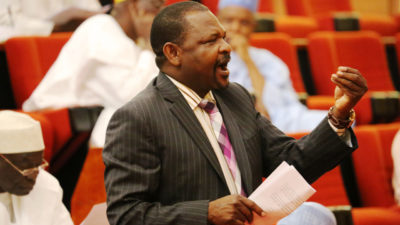
He goes on to equate acquiring grazing land, to land acquisition for schools, hospital and markets. How are these comparable? Schools and hospitals are non-profit government interventions for social wellbeing of the citizens. How can these be compared with a profit and wealth-creating venture designed for a section of the citizenry? Can a sick person or student go to a reserve? NO! Can a pastoralist visit a hospital, school, and market? Yes! As stated earlier, public purpose grants access of use and equality to all for a specific period and duration not to a certain class of people. A market is a melting point for all users, not for select or special users whose sole aim for being in business is profit or wealth creation as stated by the senator.
Senator Ningi includes identification of Fulanis as a benefit for the bill. Are Fulanis not Nigerians? How are other Nigerians to be identified? Sen. Tukur Bello with no facts avers the bill will minimise Fulani migration and mitigate clashes. Does evidence from the existing legislation support this assertion? Senator Yusuf Nagogo confirms the exclusivity and sectionalism of the use of the reserve, with his argument that grazing reserves have a “historical background to the people of the North.”
Senator Isa Galaudu ups the ante, with his thesis that creating reserves will translate to “cheaper dairy products” How? Will government after bearing the cost of establishing and maintaining the reserve subsidise the products? He further suggests that setting up grazing reserves and routes across the nation will boost output. How and for whose financial benefit?
Senator Ita Enang’s contribution is that since the North has a history with reserves, extending it to the South will also benefit the meat eaters and milk drinkers from the South. At what cost? The good Senator forgot all about the Obudu Cattle Ranch in his backyard – a tourist haven and dairy and milk factory waiting to unleash its full potential.
In all, there was no dissenting voice. Only Sen. David Mark hinted at a possible conflict with the constitution. How can such a divisive motion have 100% approval rating? Is this a campaign hangover as indicated by Dr. Iro?
The purpose of governance is to translate electoral promises to profitable ventures for the governed. Governance should be proactive, cohesive, prudent and forward-looking. It should not be regressive. It beats the imagination that having identified the problem to be demand for competing land use between farmers and nomadic herders, which results in clashes, that law makers or any administrator of a modern day society will be proposing an ineffectual, retrogressive potentially volatile solution to its citizen. What is expected are progressive laws that will bring the pastoralists up to speed with modern methods of livestock farming through ranching and other modern techniques practised in nations with large livestock populations and in some African countries like Kenya.
For the Fulanis: The bill is a gross disservice to our Fulani and pastoralist brothers and sisters. It seeks to keep them backward and in chains, denying them of access to financial benefits, loans and funds needed to improve yield and income. The thinking should be on how to develop programmes and motivations that will encourage sedentary pasturing and ranching within the existing regions where climate is favourable.
The people should reject this attempt at crippling their ability to grow with the modern age and increase their individual revenue yielding potential, lift them out of poverty, increase the number of cattle owners, as against the current system where a large percentage are herders for others.
For other Nigerians: The bill goes against the spirit and letter of the Constitution. It is segregationist, separatist, inequitable, and unjust to the people who are not traditional pastoralists – whose main source of living is produce from their farms, rivers and the ocean. What happens to those whose lives depend on planting cassava, yams, rice, tomatoes, potatoes, palm plantations, vegetables, fish, bush meat hunting after their land has been taken? Will government set up agricultural, and fishery reserves, especially for the people of the South-South who are also in clashes with oil companies having lost their water for fishing to oil exploration?
With population growth and the huge housing deficit, increasing demand for land for accommodation, whose land needs should be subjugated for the other without crises? What land will be available for farming to feed the citizens?
Focus should be to strengthen laws on agriculture, a venture common to all Nigerians, irrespective of tribe and location. A virile agricultural industry not only guarantees security, it is a major impute to livestock development. Food after all (for animal and man) is the main reason for the clashes.
The bill is more a recipe for disaster than a solution. The senators should come up with laws that create an enabling environment for SMEs to thrive in all forms of productive industry. They should not encourage the culture of laziness, the attitude of being spoon fed, as oil has done for the last 50 years. Should the Cyclopic vision exhibited by this bill be allowed to succeed? The answer is No!
GUARDIAN
END

Be the first to comment